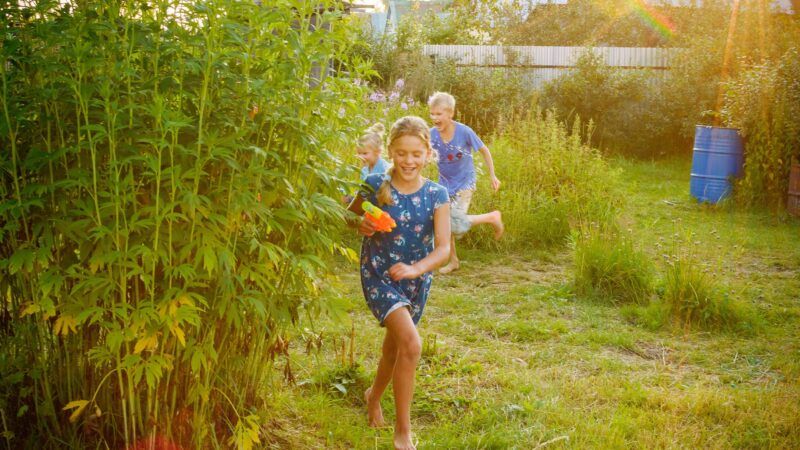In Oklahoma and Texas, Parents Who Let Their Kids Play Outside Will No Longer Fear Neglect Charges
The Reasonable Childhood Independence bills restore basic freedoms to kids and their families.

Go out and play, kids. It's about to be legal in Oklahoma and Texas.
Both states passed "Reasonable Childhood Independence" bills on Wednesday, ensuring parents that they can let their kids walk and play outside, stay home alone, and engage in other normal childhood activities without being accused of abuse or neglect. These bills just await their governors' signatures.
Also on Wednesday, the Nevada Assembly's Health and Human Services committee held hearings on a similar bill that proved so popular, all the committee members ended up asking to co-sponsor it. (It had already passed the state's senate.)
This is a triple-header for parents and kids.
Let Grow supported this legislation because we have heard from so many parents saying they want to let their kids go climb trees or run errands, but they're afraid someone could call the police and open an investigation. So they keep the kids inside, on the couch. Now, within days in Oklahoma and Texas—and probably within weeks in Nevada—it's Independence Day for families.
The bill, modeled on the Free-Range Parenting bill passed in Utah in 2018, had bipartisan sponsorship in Oklahoma and Nevada. In Nevada, state senator Dallas Harris, a Democrat, co-sponsored the bill. She admitted that she sometimes leaves her nine-year-old alone when she makes a quick Walmart pickup. Other assembly members said they wished the law had been in place when they were raising their kids.
The Nevada bill's co-sponsor, Assemblywoman Alexis Hansen, said, "This is one of the most important things we could be doing to let children grow." Her grown son, Daniel Hansen, testified in favor of the bill, in part because recently his sons, ages eight and 10, had been playing down his quiet street when a passerby called 911 to report unsupervised children.
The fire department came and escorted the children home.
It is precisely this kind of unnecessary intervention the new laws will help to curb, giving child protective authorities more time to focus on actual cases of abuse and neglect.
"The legislation in all three states focuses on clarifying the difference between real neglect and reasonable parenting decisions," said Diane Redleaf, Let Grow's legal consultant. "When parents leave their kids in obvious danger, that's neglect. But when they decide their child can walk to grandma's because mom has two jobs, the law needs to start supporting that parent."
In Oklahoma, state Rep. Chad Caldwell, a Republican, sponsored the Reasonable Childhood Independence bill in part because as a latchkey kid, "I'd ride my bike home from school, grab a snack, and go back out again to play king of the mountain in the empty lot nearby," he wrote in an op-ed. Those experiences gave him the confidence— and fun—he wanted today's kids to enjoy, and his co-sponsor from across the aisle, Jacob Rosecrants, felt the same.
In Texas, Andrew Brown of the Texas Public Policy Foundation shepherded the bill. His state had been home to a couple infamous stories of child protective overreach. In 2014, Austin mom Kari Anne Roy's six-year-old was playing within view of the house for about ten minutes when a woman marched him home and called the cops. Police officers paid Roy a visit, and a week later, child services interviewed each of her children separately. They asked the boy, 12, if he had ever done drugs, and the girl, eight, if she had seen movies with people's private parts—something she had never even heard of.
In Houston the next year, mom Laura Browder was arrested for having her kids wait 30 feet away from her in a food court when she had a job interview there and didn't have time to line up child care. The arrest came after she had accepted the new job.
For struggling moms, said Nevada's Sen. Harris, this bill "provides a little more equity." She and Rep. Hansen worried aloud that their own single moms might have been considered neglectful by today's standards. Statistically, according to a study in the American Journal of Public Health, 37 percent of American children will be reported to child abuse hotlines over the course their childhood. That number rises to 53 percent for African-American kids.
Harris acknowledged how unusual it was to find such bipartisan agreement on a bill. She is a gay, African-American Democrat from Las Vegas. Her co-sponsor, Hansen, is a straight, white Republican from a rural area. Harris laughed when she said, "If you see Rep. Hansen and me as the sponsors of the same bill, you know it is either a really good idea or a really bad idea. We think it's a really good idea."
It is a really good idea, and just in time for summer.


Show Comments (53)